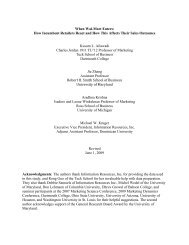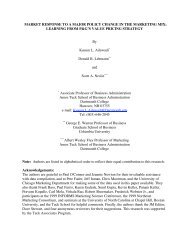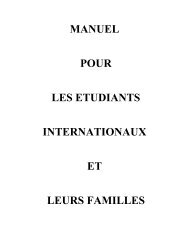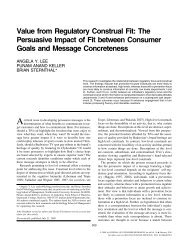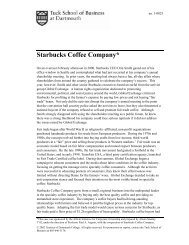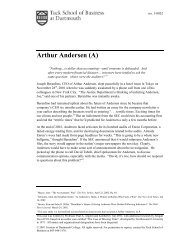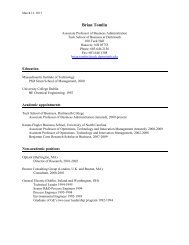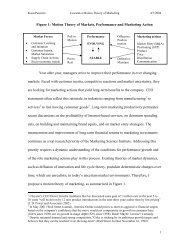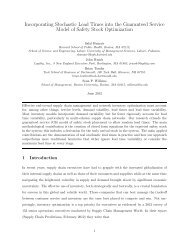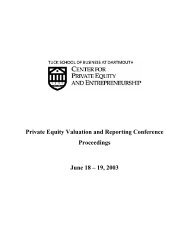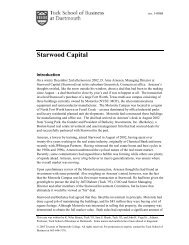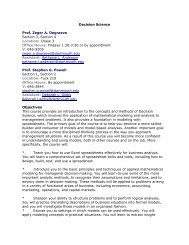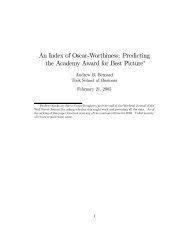tax notes international - Tuck School of Business - Dartmouth College
tax notes international - Tuck School of Business - Dartmouth College
tax notes international - Tuck School of Business - Dartmouth College
Create successful ePaper yourself
Turn your PDF publications into a flip-book with our unique Google optimized e-Paper software.
CHINA (P.R.C.)<br />
On December 16, 2008, the SAT released nine RPT<br />
disclosure forms (Guo Shui Fa [2008] No. 114) to replace<br />
forms required under China’s previous annual<br />
income <strong>tax</strong> return filing system for foreign investment<br />
enterprises. The new RPT forms ask companies to disclose<br />
whether they have prepared contemporaneous<br />
transfer pricing documentation when filing the annual<br />
CIT return. (For prior coverage, see Doc 2008-26922 or<br />
2008 WTD 247-18.) The RPT forms must be filed together<br />
with the annual EIT return package.<br />
The SAT on January 9 published the Implementation<br />
Regulations for Special Tax Adjustments (Guo<br />
Shui Fa [2009] No. 2, or Circular 2), which define the<br />
scope <strong>of</strong> China’s transfer pricing rules and set out the<br />
contemporaneous transfer pricing documentation rules<br />
that both foreign and domestic enterprises must follow<br />
under China’s new EIT law. (For prior coverage, see<br />
Tax Notes Int’l, Jan. 19, 2009, p. 205, Doc 2009-521, or<br />
2009 WTD 7-1.)<br />
Circular 2 provides for some exemptions from the<br />
contemporaneous documentation rules. For example,<br />
companies may be exempt if the value <strong>of</strong> their intercompany<br />
tangible goods transactions is below CNY<br />
200 million (about $30 million) and if the value <strong>of</strong><br />
their intercompany nontangible goods transactions is<br />
below CNY 40 million (about $6 million), not counting<br />
sales and purchases that are covered by cost-sharing<br />
agreements or advance pricing agreements.<br />
An exemption is also available if the foreign shareholding<br />
in the enterprise is less than 50 percent and the<br />
enterprise traded only with domestic related parties.<br />
Finally, an exemption is available for transactions covered<br />
by an APA.<br />
Details<br />
Ho outlined the company filing requirements for<br />
calendar year 2008, saying companies must file the<br />
new annual EIT return package and the new RPT<br />
forms by May 31, and prepare the contemporaneous<br />
transfer pricing documentation by December 31, which<br />
is an extended deadline for calendar year 2008. Normally,<br />
the due date for contemporaneous documentation<br />
will be May 31 <strong>of</strong> the year following the <strong>tax</strong> year,<br />
he said.<br />
The new EIT return asks for information <strong>tax</strong>payers<br />
previously did not have to provide. For example, Ho<br />
said, the new return now has lines for:<br />
• a <strong>tax</strong> adjustment <strong>of</strong> assets measured at fair value;<br />
• an analysis <strong>of</strong> income or loss from long-term investments;<br />
• a <strong>tax</strong> adjustment <strong>of</strong> advertising and promotion<br />
expenses;<br />
• a <strong>tax</strong> adjustment <strong>of</strong> depreciation or amortization;<br />
and<br />
• a <strong>tax</strong> incentive statement for both grandfathered<br />
and new <strong>tax</strong> incentives.<br />
Ho also urged <strong>tax</strong>payers to act swiftly to complete<br />
the nine new RPT forms by May 31 for <strong>tax</strong> year 2008<br />
— even though they only came out in December 2008.<br />
‘‘While it seems like we still have a few more months<br />
to go, given the uncertainty and the difficulties in handling<br />
some <strong>of</strong> the <strong>tax</strong>ation treatment, there may not be<br />
a lot <strong>of</strong> time in preparing the returns for filing,’’ Ho<br />
said. He said the new RPT forms are much more complex<br />
than the old filing regime that was in place for<br />
calendar year 2007.<br />
After the webcast, Ho told Tax Analysts that the<br />
new EIT return forms contain many items and adjustments<br />
that will be subject to subsequent regulations<br />
and further SAT guidance. ‘‘As a result, there will be<br />
many cases <strong>of</strong> uncertain <strong>tax</strong> treatment, which will<br />
likely increase <strong>tax</strong>payer compliance burdens,’’ he said.<br />
The obligation to provide more detailed information<br />
on intercompany transactions and other new filing<br />
rules ‘‘may be too great a responsibility to delegate entirely<br />
to the <strong>tax</strong> and accounting staff <strong>of</strong> the Chinese<br />
subsidiaries’’ <strong>of</strong> U.S. parents, Ho said. ‘‘Therefore, a<br />
much more coordinated effort to work with the local<br />
Chinese entity will likely be necessary to satisfy the<br />
greater Chinese compliance responsibilities.’’<br />
Landau predicted the expanded information available<br />
to Chinese <strong>tax</strong> examiners could make future <strong>tax</strong><br />
examinations ‘‘a very bumpy ride.’’ He said U.S. companies<br />
with Chinese operations may need to undertake<br />
‘‘new information gathering processes and protocols’’<br />
to meet the new compliance requirements.<br />
Finally, the panelists cautioned that companies must<br />
correlate the EIT return package, RPT forms, and any<br />
contemporaneous transfer pricing documentation. Even<br />
though the forms and filings are all separate, <strong>tax</strong>payers<br />
must ensure a consistent position for all <strong>of</strong> them, according<br />
to PwC.<br />
Ecuador<br />
♦ Charles Gnaedinger, Tax Analysts.<br />
E-mail: cgnaedin@<strong>tax</strong>.org<br />
Congress Approves Tax Package<br />
Ecuador’s recently inaugurated National Congress<br />
has approved a new <strong>tax</strong> package designed to combat<br />
the effects <strong>of</strong> the global financial crisis, including<br />
amendments to the income and capital flight <strong>tax</strong>es and<br />
a new <strong>tax</strong> on deposits held abroad. The amendments<br />
entered into full force and effect on January 1.<br />
The amendments, published in Official Gazette 497<br />
on December 30, 2008, are in response to a package <strong>of</strong><br />
measures prepared by President Rafael Correa Delgado.<br />
Ecuador’s economy is largely dependent on oil<br />
390 • FEBRUARY 2, 2009 TAX NOTES INTERNATIONAL<br />
(C) Tax Analysts 2009. All rights reserved. Tax Analysts does not claim copyright in any public domain or third party content.



